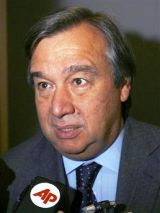UNHCR official calls for UN peacekeeping force in Darfur
Jan 24, 2006 (UNITED NATIONS) — A large U.N. peacekeeping force is needed in Sudan’s Darfur if a “total humanitarian disaster” is to be avoided in the country’s Darfur region, the U.N.’s top refugee official said Tuesday.
 Antonio Guterres, the U.N. high commissioner for refugees, told the Council that international solidarity in helping create a peace agreement in Sudan and then backing that up with troops on the ground is desperately needed.
Antonio Guterres, the U.N. high commissioner for refugees, told the Council that international solidarity in helping create a peace agreement in Sudan and then backing that up with troops on the ground is desperately needed.
“I do believe the Sudan-Chad situation is the most challenging humanitarian problem we face today in the world,” Guterres said at a press conference following his Council appearance.
The Darfur crisis erupted in early 2003 when rebels took up arms against what they saw as years of state neglect and discrimination against Sudanese of African origin.
Sudan’s government is accused of using Janjaweed militia to unleash a campaign of murder, rape, arson and looting to stamp out the rebellion, leaving some 2 million people as refugees.
The conflict has spilled over into neighboring Chad, which along with Uganda and Eritrea accuses the Sudanese government of arming and supporting rebels fighting their governments. Sudan denies those charges.
An unknown group of armed men attacked the town of Guereda in Chad this weekend, forcing the U.N. refugee agency to reduce its staff in eastern Chad.
Guterres told the Security Council that international pressure on Sudan is essential for a peace agreement to materialize in the country and to avoid the explosion of a wider crisis.
“This is crucial. The proof that this is crucial is that the instability in Darfur is very quickly having an impact in Chad,” Guterres said. “We had to relocate part of our staff. We have 200,000 refugees on the Chad border. Military confrontation in that region would be a total humanitarian disaster.”
Some 7,000 African Union troops are now charged with monitoring an April 2004 cease-fire that is being regularly broken by all parties.
But two weeks ago, Jan Pronk, the top U.N. envoy in Sudan, called for a force of as many as 20,000 troops to provide security in the vast and arid region.
The AU said it accepted the Pronk’s call in principle and that its ministers would make a final decision at the end of March.
Augustine Mahiga, Tanzania’s ambassador to the U.N. and president of the Security Council, commended the work of AU peacekeepers in Sudan, but said a “large” U.N. peacekeeping force is now needed.
“It will be large and resources will be required,” Mahiga said. “The AU would continue to participate operationally and politically.”
The AU began its annual summit on Monday in disarray, as Sudan was in line to take over the presidency of the group, essentially putting them in charge of the peace keeping force in their nation.
On Tuesday, however, Sudanese officials relented and agreed to allow Congo to take the presidency of the AU this year, while they will assume the position in 2007.
(AP/ST)
